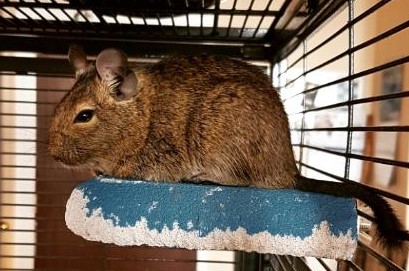
Today is the last day of September, which means it’s time to say good-bye (for now) to our Animal of the Month, the degu. We hope you were following us on Twitter @ExoticPetVets all month long as we tweeted about these social and intelligent rodents. But if you missed any of our tweets, here is a summary. Did you know?:
- Degus (Octodon degus) are small rodents endemic to west-central Chile.
- Degus living in the wild are found on the lower western slopes of the Andes mountains, where they are most commonly found below an elevation of 1,200 metres (3,900 feet) due to their intolerance of the thinner air at higher elevations.
- In the wild, degus live in an ecosystem called “matorral,” which is a semi-arid shrubland with a Mediterranean climate characterized by a balmy climate, dry summers and rainy winters.
- In a quick first glance, it may be easy to mistake a degu for a gerbil as they do look similar to each other. But degus are larger than gerbils.
- Adult degus are typically around 30 cms (12 inches) in length, including their tails, which are around 13 cms (5 inches) long.
- Their tails have a tuft of black fur at the ends. And that’s sometimes why degus are referred to as “brush-tailed rats” or “trumpet-tailed rats” – even though degus aren’t rats.
- Degus are covered with thick fur, which is a yellowish-brown colour. The fur immediately around their eyes is lighter in colour while the fur on their bellies is tan coloured.
- Degus have fairly large ears relative to their head size. Their ears don’t have much fur on them and are darkly pigmented.
- Degu ears resemble butterfly wings and are shaped this way to not only regulate body temperature, but also to capture sound effectively.
- Degus are very vocal and will communicate with each other through more than a dozen unique sounds. For example, happy degus make chirping or warbling sounds while rapid squeaking is indicative of fear.
- Degus are extremely social animals and in the wild will live in large colonies that can include as many as 100.
- Wild degus will work together within their group to dig out and build an elaborate underground burrow that includes chambers for storing food, sleeping and nurseries to care for their babies.
- Degus have also taken the proverb “It takes a village to raise a child” to heart as the females of the group will help with the caring and nursing of each other’s babies.
- In the wild, degus have an average lifespan of between 1-4 years. When properly cared for in captivity, degus can live between 6-8 years on average.
- While captive degus don’t have to worry about predators, degus have a genetic predisposition to developing certain health problems that can impact how long both wild and captive degus live; such as diabetes, Alzheimer’s disease and cataracts.
- Degus are rodents just like guinea pigs, but that’s not the only thing they have in common. Degus are also proverbial “guinea pigs” when it comes to being research subjects.
- Because of their physical, psychological and medical make-up, degus are studied for a wide range of conditions including diabetes, circadian rhythms, ADHD, Alzheimer’s symptoms, cataract development, social attachment, play behaviour and separation anxiety.
- Since degus live in semi-arid habitats in the wild, they naturally don’t drink much water. As such, degus are also studied for their ability to concentrate their urine and conserve water during periods of drought.
- Wild degu populations are greatly affected by the weather changes caused by El Niño and La Niña, and scientists believe they will be profoundly affected by the effects of climate change.
- Degus are very smart and are believed to be the first rodents documented to be taught how to use tools.
- In 2008, researchers in Tokyo reported that they taught degus to use small rake-like tools to retrieve food rewards beyond their reach.
- It’s illegal to have a degu as a pet in Newfoundland and Labrador. It’s also illegal to have pet degus in New Zealand and the American states of California, Alaska, Utah, Connecticut and Georgia.
- The jurisdictions which outlaw keeping degus as pets do so because of fears that released or escaped degus have the potential to be an invasive species that will wreak havoc on the local ecology.
Degus have been featured as our Animal of the Month once before. Check out our blog post from March 2016 to see what we tweeted about degus the first time they were in our spotlight!

